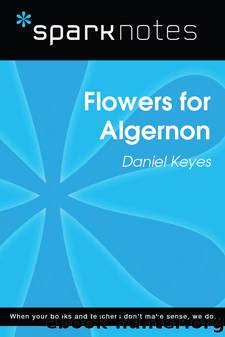Flowers for Algernon: SparkNotes Literature Guide by SparkNotes

Author:SparkNotes [Sparknotes Editors]
Language: eng
Format: epub
Tags: Study Guides
ISBN: 9781411475144
Publisher: Spark
Published: 2014-09-10T00:00:00+00:00
Analysis
Charlieâs intellectual journey continues in this section, but now Keyes only hints at the outward manifestations of Charlieâs genius. Instead, Charlieâs inward journey becomes his focus and, thus, the focus of the novel. Alice notes this trend, telling Charlie she does not understand his talk about âcultural variants, and neo-Boulean mathematics, and post-symbolic logic.â She now associates him with these complex terms and ideas, reflecting her inability to relate to him now that he is off in his own world. Charlie now studies his own emotions much as he has studied grammar, Shakespeare, economics, and other academic pursuits. As he walks home from his upsetting encounter with Alice, he seems to analyze his emotions even as he is going through them.
Charlieâs belief that his love for Alice is inversely related to his level of mental ability indicates a conflict between intellect and emotion. This conflict is also embodied in the opposing characters of Nemur and Alice. Professor Nemur, an obsessive, career-driven academic determined to make a name for himself as a great scientist, represents one extremeâthe idea that intelligence is everything in human life. Nemur believes that nothing besides intellect matters and that mental disability makes an individual less than human. Alice, as a compassionate and generous teacher of disabled adults, represents the opposite perspectiveâthe idea that kindness and feeling are more important than intelligence. Both Nemur and Alice frustrate Charlie, Nemur because of his arrogant dismissal of Charlieâs former life, and Alice because of her disinterest in Charlieâs new mental powers. Charlie struggles to find a balance between these two perspectives throughout the rest of the novel and searches for a way to combine his superhuman intelligence with human feeling without betraying either.
Charlieâs childhood memory of Norma and the dog puts forth the idea that intelligence is not the most important human trait, but does so in a sarcastic fashion. When Norma is denied her dog because of her refusal to share it with Charlie, she concludes that Charlie is getting preferential treatment because of his disability. She threatens to âloseâ all of her intelligenceâa feat just as impossible as Charlie gaining intelligenceâin order to receive treatment equal to Charlieâs. This idea is a curious reversal of the pattern of condescension toward the mentally disabled, as in this moment, Norma does not feel superior to Charlie but envious of him. Keyes reinforces the notion that superior intelligence does not necessarily lead to a superior capacity for happiness.
Charlieâs struggle is complicated by his burgeoning sexual desire, which comes into direct conflict with his ingrained sense of shame and self-loathing associated with sexuality. Though Charlieâs newfound intelligence helps him gain understanding about why he feels so confused about sex, he still cannot control his turmoil. When the woman in the park offers to make love to Charlie, he is initially prepared to take her up on her offer. When he kisses her, he does not experience the extreme paralyzing hallucinations that he has had in similar situations with Alice. Keyes implies
Download
This site does not store any files on its server. We only index and link to content provided by other sites. Please contact the content providers to delete copyright contents if any and email us, we'll remove relevant links or contents immediately.
Pale Blue Dot by Carl Sagan(4984)
Cracking the GRE Premium Edition with 6 Practice Tests, 2015 (Graduate School Test Preparation) by Princeton Review(4263)
Pocahontas by Joseph Bruchac(4230)
Unfiltered by Lily Collins(3994)
The Emotionary: A Dictionary of Words That Don't Exist for Feelings That Do by Eden Sher(3346)
The Daily Stoic by Holiday Ryan & Hanselman Stephen(3287)
Factfulness_Ten Reasons We're Wrong About the World_and Why Things Are Better Than You Think by Hans Rosling(3224)
The 48 laws of power by Robert Greene & Joost Elffers(3203)
The Innovators: How a Group of Hackers, Geniuses, and Geeks Created the Digital Revolution by Walter Isaacson(3107)
The President Has Been Shot!": The Assassination of John F. Kennedy by Swanson James L(3080)
Sapiens and Homo Deus by Yuval Noah Harari(3051)
Rogue Trader by Leeson Nick(3032)
Gettysburg by Iain C. Martin(2817)
The Rape Of Nanking by Iris Chang(2803)
Almost Adulting by Arden Rose(2690)
The Plant Paradox by Dr. Steven R. Gundry M.D(2596)
In the Woods by Tana French(2576)
500 Must-Know AP Microeconomics/Macroeconomics Questions(2553)
Make by Mike Westerfield(2314)
